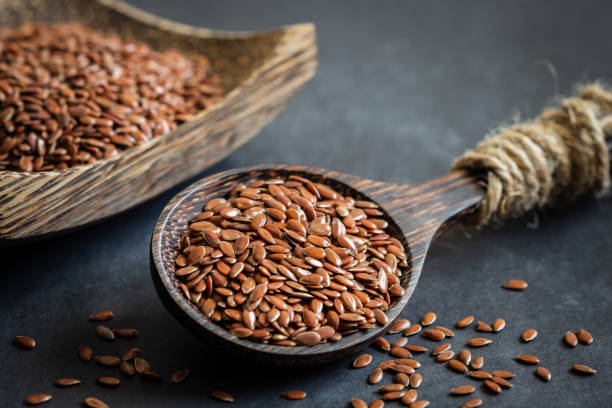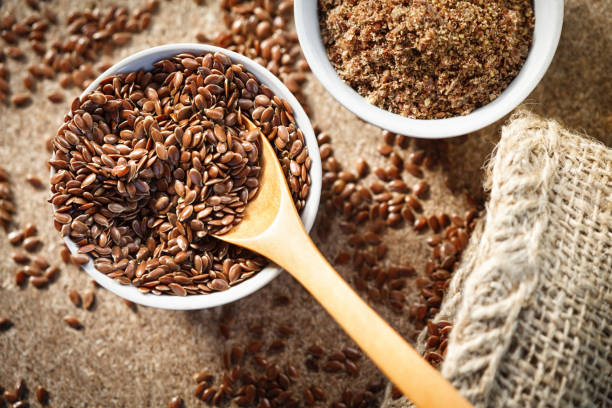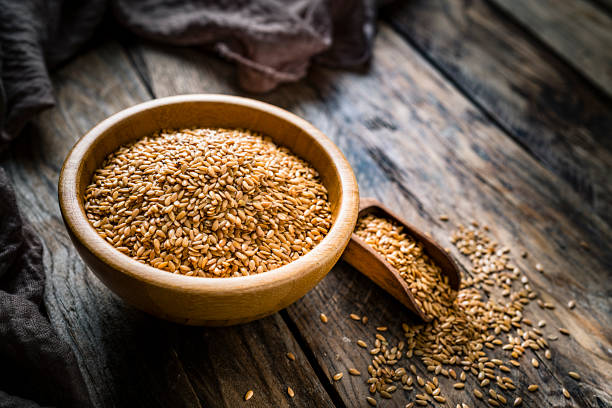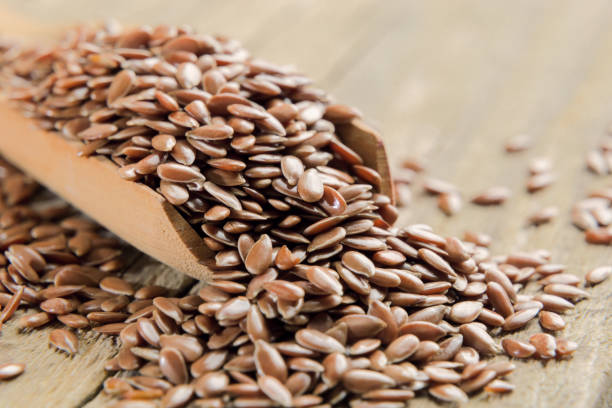Managing diabetes may seem challenging at times, but even small changes to your diet can have a big impact. One simple and powerful addition is flaxseeds. These tiny superfoods are full of fiber, omega-3 fatty acids, and plant compounds that can be especially helpful for people with diabetes. They may help control blood sugar levels, lower the risk of heart disease, and boost your overall health.
In this post, we’ll look at the top benefits of flaxseeds for people with diabetes and share easy ways to add them to your everyday meals.
What Are Flaxseeds?
They are tiny seeds that come from the flax plant and are usually golden or brown. Don’t let their size fool you—flaxseeds are packed with nutrients that support good health. They are a great source of fiber, omega-3 fatty acids, and lignans, which are plant compounds known for their antioxidant and anti-inflammatory effects. These nutrients are especially useful for people with type 2 diabetes because they may help manage blood sugar levels and support heart health.
You can find flaxseeds in several easy-to-use forms:
- Whole flaxseeds
- Ground flaxseeds (also called flaxseed meal)
- Flaxseed oil
- Flaxseed supplements

Why Are Flaxseeds Good for Diabetes?
Now, let’s take a closer look at how flaxseeds can play a key role in managing diabetes. These tiny seeds offer several health benefits that may help control blood sugar, reduce inflammation, and improve overall wellness for people living with diabetes.
1. Flaxseeds Support Blood Sugar Control
They are rich in fiber, which plays an important role in slowing down digestion. When food digests more slowly, it helps keep blood sugar levels steady and prevents sharp spikes after meals. This is especially helpful for people with type 2 diabetes. A study published in PLOS ONE found that people with type 2 diabetes who consumed flaxseed powder daily for 12 weeks showed better control of their blood sugar levels (source).
How flaxseeds help with blood sugar control:
- Slows down carbohydrate absorption – The high fiber content in flaxseeds helps slow the breakdown of carbs, leading to a more gradual rise in blood sugar.
- Reduces fasting blood glucose levels – Regular flaxseed intake may help lower blood sugar levels after periods without eating, such as in the morning.
- May improve HbA1c levels over time – Studies suggest that adding flaxseeds to your diet could lead to better long-term blood sugar control, as shown by lower HbA1c levels.
2. They Improve Insulin Sensitivity
They are a rich source of lignans and omega-3 fatty acids, both of which may help improve how your body uses insulin. These nutrients can support better insulin sensitivity, meaning your cells are more responsive to insulin. When your cells respond well, your body doesn’t need to make as much insulin to manage blood sugar levels, which can be especially helpful for people with type 2 diabetes.
3. High in Soluble Fiber
Soluble fiber in flaxseeds forms a thick, gel-like substance in your digestive tract. This slows down how quickly food is broken down and absorbed, which helps keep blood sugar levels steady. Just two tablespoons of ground flaxseeds give you about 4 grams of fiber, most of it being soluble fiber.
Benefits of soluble fiber:
- Promotes satiety (feeling full) – Helps you feel fuller for longer, which can prevent overeating and support weight control.
- Stabilizes blood glucose – Slows the release of sugar into the blood, helping avoid spikes and crashes.
- Supports gut health – Feeds healthy gut bacteria, which may also play a role in better blood sugar management.
More Health Benefits of Flaxseeds for Diabetics
1. Supports Heart Health
People with diabetes have a higher risk of developing heart disease. Adding them to your diet can help protect your heart. These tiny seeds are heart-healthy because they:
- Lower LDL (“bad”) cholesterol – They may help reduce harmful cholesterol levels, which can clog arteries.
- Help lower blood pressure – The nutrients in flaxseeds support healthy blood flow and may reduce high blood pressure.
- Improve overall cholesterol levels – They can raise HDL (“good”) cholesterol while lowering total cholesterol.
A study published in the Hypertension journal found that people who ate flaxseed daily for six months saw a significant drop in their blood pressure.
2. Aids in Weight Management
Maintaining a healthy weight is an important part of managing type 2 diabetes. It can be a helpful tool in weight management because they:
- Fiber keeps you full longer – The fiber in flaxseeds promotes feelings of fullness, which can help you eat less throughout the day.
- Protein curbs cravings – They contain plant-based protein, which helps reduce hunger and cravings between meals.
- They reduce the urge to snack – By keeping you satisfied for longer periods, flaxseeds may help you resist the temptation to snack on unhealthy foods.
3. Anti-Inflammatory Properties
Chronic inflammation is closely linked to insulin resistance and various complications of diabetes. They can help combat this inflammation thanks to their high levels of omega-3 fatty acids and lignans. These powerful nutrients work together to reduce inflammation in the body, which may help improve insulin sensitivity and lower the risk of diabetes-related issues.
Best Ways to Add Flaxseeds to Your Diet
Adding them to your meals is both simple and delicious. For the best absorption, it’s recommended to use ground flaxseeds, as whole seeds may pass through your system without being fully digested.
Here are some easy and tasty ways to include flaxseeds in your diet:
- Sprinkle on oatmeal or yogurt – A quick and nutritious topping.
- Add to smoothies – Boost your smoothie with extra fiber and omega-3s.
- Mix into pancake or muffin batter – Add a healthy twist to your breakfast or baked goods.
- Stir into soups or stews – Enhance the texture and nutrition of your favorite soups and stews.
- Use as an egg substitute in baking – For a plant-based option, mix 1 tablespoon of flaxseed with 3 tablespoons of water to replace 1 egg.

Flaxseed Dosage for People with Diabetes
While there is no strict recommendation, research suggests that consuming 1–2 tablespoons (10–20 grams) of ground flaxseeds per day can provide health benefits.
Important Tips:
- Start with 1 tablespoon a day – Begin with a small amount and gradually increase to avoid digestive discomfort.
- Drink plenty of water – They are high in fiber, so it’s essential to stay hydrated to prevent constipation.
- Store flaxseed meal in the fridge – To keep it fresh and preserve its nutrients, always store ground flaxseeds in the refrigerator.
Possible Side Effects and Precautions
They are generally safe for most people, but there are a few important considerations to keep in mind:
- Start slow – Begin with a small amount to help your body adjust and avoid gas or bloating.
- Consult your doctor if you’re on blood thinners – They can have an effect on blood clotting, so it’s important to check with your healthcare provider first.
- Don’t rely on flaxseeds alone – While flaxseeds are a beneficial addition to your diet, they should not replace other treatments for diabetes. They work best as part of a balanced approach.
Pregnant or breastfeeding women – It’s best to avoid flaxseed supplements unless advised by a doctor, as they may affect hormone levels.
Scientific Support for Flaxseed and Diabetes
Here are some credible studies that support flaxseed’s benefits:
- PLOS ONE (2014): Flaxseed powder improved fasting blood sugar and insulin sensitivity in people with type 2 diabetes (link).
- Nutrition & Metabolism (2011): Flaxseed fiber drink reduced blood glucose after meals (link).
- Hypertension (2013): Flaxseed lowered blood pressure in hypertensive patients.
How to Choose and Store Flaxseeds
Whole vs. Ground Flaxseeds
- Whole flaxseeds – They have a longer shelf life but are harder for your body to digest, which means you might not get all of the health benefits.
- Ground flaxseeds – These are easier for your body to digest and absorb, making them more effective for blood sugar control and overall health benefits.
Storage Tips
- Ground flaxseeds – Keep them in an airtight container and store them in the fridge or freezer to maintain their freshness and nutrients.
- Flaxseed oil – Store it in a dark bottle and keep it in the fridge to protect it from light and heat, which can cause it to spoil.
- Avoid exposure to light and heat – Both flaxseeds and flaxseed oil can go bad if exposed to light or heat, so always store them properly to preserve their benefits.
Flaxseeds vs. Other Seeds for Diabetes
Here’s how flaxseeds compare to other seeds:
| Seed Type | Fiber (per 2 tbsp) | Omega-3 | Blood Sugar Benefits |
|---|---|---|---|
| Flaxseeds | 4g | Yes | Excellent |
| Chia Seeds | 5g | Yes | Excellent |
| Pumpkin Seeds | 1g | No | Moderate |
| Sunflower Seeds | 2g | No | Moderate |
Flaxseeds and chia seeds are both top picks for blood sugar control.

Can Flaxseeds Replace Medication?
They can support diabetes management, but they are not a replacement for medication. Always follow your doctor’s advice. Think of flaxseeds as part of a healthy diabetes-friendly lifestyle that includes:
- A balanced diet
- Regular physical activity
- Medication or insulin, if prescribed
- Stress management
- Regular check-ups
Final Thoughts
They may be small, but they are a powerful superfood for people with diabetes. They provide several health benefits, including:
- Better blood sugar control – They help stabilize blood sugar levels and improve insulin sensitivity.
- Improved heart health – Their omega-3 fatty acids and fiber can help reduce cholesterol and lower blood pressure.
- Support for weight management – The fiber and protein in flaxseeds help control hunger and promote satiety.
- Anti-inflammatory effects – They contain antioxidants that help reduce inflammation, which is important for overall health and diabetes management.
Incorporating them into your daily routine is easy, affordable, and delicious. Just one to two tablespoons a day can help you take a positive step toward improved health and better diabetes management.
Take Action: Start Today!
Here’s how to begin:
✅ Buy ground flaxseeds or grind your own
✅ Add a spoonful to your breakfast or smoothie
✅ Stay consistent—use it daily
✅ Talk to your doctor if you’re on medication
Your health is in your hands—one seed at a time!

